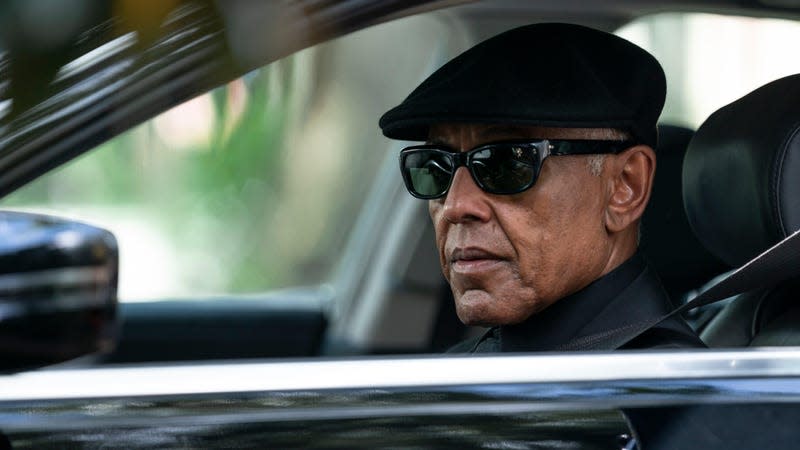Parish review: Giancarlo Esposito breaks bad in New Orleans

- Oops!Something went wrong.Please try again later.
One last job. Then he’s out, to focus on the family. One can tell, because Parish, not more than a few scenes into his eponymous show (which premieres March 31 on AMC), states, “After this job I am out, focus on my family.” But of course he can’t quite help himself. Truly, he misses the times, the putting on of shades to get into character, doing parking-lot donuts with an old buddy hanging out the window and whooping in the late-night air, getting the engine revvy and punchy (he hits a heavy bag, too, for catharsis and connection and tough guy-ness), and blowing up a beater Toyota for a diversion before smoothly swiping keys to a throatily-humming Porsche Cayenne.
Even though the man seems to be repeatedly reminded of “the kind of crap” he used to “pull” and told “I’ve thought you weren’t about that life anymore,” Parish the show leans unapologetically on the tropes of Unforgiven and Thief—tales of hard dudes with half-decent hearts who are tugged back in, to be framed by a tough world and their inescapable leanings. “I did some things I’m not proud of,” he laments. This particular brand gives a modern update, with sprinklings of Liam Neeson-ish grumbles about a “particular set of skills,” with episodic bits maybe inspired by Michael Mann’s Collateral, and with a visceral vibe reminiscent of the video game Driver. (The show was originally a U.K. series called The Driver.) There’s also plenty of buddy bitching and ribbing, familial strain, and the requisite tough reconciliation reminiscent, of, yes, Breaking Bad.

Parish
B-
B-
Parish
Parish has long ago broken good, but finds himself flipping back, swayed by a confluence: the financial woes of his private-cab business, and the spell of his beer-slurping, boat-living, six-o’clock shadowed buddy who needs a lifeline (Skeet Ulrich, straight out of central casting). Giancarlo Esposito brings his rigid, almost chilly, coolness, with ever upright posture and the sort of badass stoicism of a man who has likely never spilled a drink in his life. With glasses he looks the part of mild mastermind, half “how is everything here?” middle manager and half meth kingpin. Though at this point we catch him beleaguered, traumatized, grieving the loss of his teenage son, the result of a botched carjacking that transpired one year earlier. He even dons tissue on a razor knick at one point, showing us he’s off.
But going as far as he does here, so fast, seems like skipping a gear or two. After all, Skeet Ulrich is not nearly as charming as he thinks he might be, the duo’s chemistry not quite buddy-bad-guy believable. And, as is made clear by his wife, why not just sell your house and start over? But that’s too practical. And after all, just when he thought he was out….
Parish does have a couple things going for it to raise the stakes beyond a thinking dad’s March Madness cooldown show though. The first is New Orleans herself, a backdrop shadowing, spicing, Dixieland-soundtracking, as sensual as languid, as friendly as menacing, as good-timey as back-alley, as welcoming as unknowable, so damp with recent trauma—one too deep to ponder the hope of ever healing. We get a look at the shell of an abandoned Six Flags, now used as a body dump. Meanwhile, a generic parade winds through the Quarter, some harebrained Hollywood mashup of second line and jazz funeral and Mardi Gras Indians.
The show leans into the setting: There are nods to getting a “res at Commander’s Palace,” a “two bedroom in Covington,” and “House Of The Rising Sun” plays loud and prominent. There is a shootout and bit of cat-and-mouse in and around St. Louis Cemetery No. 2. Ulrich talks like almost every other bartender in New Orleans, sly and drawly and thick with loser’s wisdom and down luck that you can’t help but be drawn back to, for one more. It all has that crumbling-palace beauty, that unmistakable flavor that has lent a vibe to everything from Easy Rider to NCIS: New Orleans.
The other standout ingredient is Esposito himself. All uptown businessman, with flat cap and manicured Caddie, he navigates, or really, punches the gas with prejudice, through a slog of 16-year-old-daughter grief. He passes the stinky exhaust of Zimbabwean mobster toughs who chew with mouths open and lick fingers with laughs and tough-guy platitudes and old-country wisdom. He deals with people with names like Horse. And throughout is that presence, ever-level, an actor of tense and taut energy always just an inch down, a man at home in that state of maybe just about to blow. Something is roiling beneath his slight but sturdy shoulders, the black leather of driver gloves and shoes. Everything is met head on, straight-faced with coiled integrity.
One last job, of course, becomes a series of penultimate tasks and mini missions, too exotic and unclear to recap here. But there are stolen passports, African human traffickers, blood, violent outbursts, bodies to be dumped, muscly V8 accelerations, stand-offs, bearded baddies, double crosses, haunting memories of a dead teenager, and the reality of running a cab service business in the era of ride sharing. Somehow it’s all mostly a smooth, if familiar, ride—and also something of a side-glancing and tacit plug for the New Orleans tourism board. It’s also a reminder that times can be tough out there for the little guy. If you go down south, do your part and tip the driver. You don’t know what he’s going through. Or what’s in the trunk.
Parish premieres March 31 on AMC

